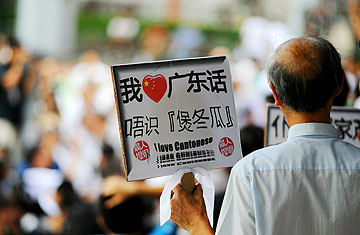
A man holds a sign professing his love for Cantonese at a rally in Hong Kong on Aug. 1, 2010
Despite an official warning to stay away, hundreds of protesters gathered in the southern Chinese city of Guangzhou on Aug. 1 for the second Sunday in a row to protest in support of the Cantonese language. The demonstrators were met by a heavy police presence at the city's People's Park, and several people were detained.
The rallies were inspired by a proposal by a Guangzhou political advisory body to increase the amount of local television broadcast in Mandarin, China's official language, to make visitors feel welcome during the Asian Games being held in the city in November. That touched a nerve among some people in the megalopolis who felt Cantonese, which is widely spoken in the region, was under assault.
Last week, Ouyang Yongsheng, deputy director of the general office of the Guangzhou city government, said at a press conference that there were no efforts to marginalize Cantonese and that those spreading rumors to the contrary "will be duly punished," the China Daily reported. One person was held after the initial July 25 protest and placed under a five-day detention for promoting the demonstration online, according to the newspaper.
Following yesterday's protest, the Guangzhou public-security bureau issued a notice on its website that the gathering at the People's Park was the work of "a small number of people with insufficient rationality and one or two with ulterior motives" and that "individual troublemakers would be punished." Ye Du, a Guangzhou writer who attended both protests, said the authorities took a far more aggressive stance this weekend. "At least a thousand policemen were at the scene," Ye said. He was detained shortly after arriving at the park Sunday. "By 2:30 p.m., I was taken away by some cops to 'have coffee,' and they didn't release me until around 6 p.m."
In Hong Kong, a semiautonomous Chinese city where Cantonese predominates, about 200 people gathered at Southorn Playground in the Wanchai district on Sunday to support the mainland protest. "We are here to echo the Guangzhou people's voices because we believe Guangzhou people are our brothers and sisters," said Hon Lin Shan, an official with the Hong Kong Professional Teachers' Union. "If their freedom of choice is interfered with, sooner or later Hong Kong people's freedom of choice will be interfered with, because we are in the same country."
Cantonese is widely used in Guangzhou and in parts of the neighboring region of Guangxi, as well as in Hong Kong. Cantonese is also commonly spoken in many Chinatowns around the world, though it now has greater competition from the Fujianese and Mandarin imported by more recent generations of migrants. Cantonese is the language of Cantopop music and most Hong Kong films, which are widely influential in the greater Chinese-speaking world. It is tonally more complex than Mandarin and has a few unique characters, though in formal writing the languages are largely the same.
For most of the past century, successive Chinese governments have encouraged the use of standard Mandarin, which is based on the Beijing dialect. In classrooms in the South, it is common to see signs that say "Please speak putonghua," — the Communist Party's name for standard Chinese — to remind children not to use their local dialect while at school.
The pro-Cantonese protests in Guangzhou and Hong Kong have been fairly small, but they represent a broader effort by speakers of common Chinese dialects to stand up for their languages in the face of strong official promotion of Mandarin. In Shanghai, one radio host's denouncement of a listener's plea in December to not use Shanghainese on-air became a hot topic of that dialect's supporters online. Local comic Zhou Libo has won huge audiences for his routines that use Shanghainese almost exclusively.
But while the authorities tolerate those types of cultural expression, they are much more wary of organized protests. "The central government is very concerned about unity," says Joseph Cheng, a political-science professor at City University of Hong Kong. "There's a lack of tolerance for these things. They see this as a sort of contamination — lack of political correctness and the result of outside influences."
Demonstrators at the Hong Kong rally argued that Cantonese and Mandarin should be allowed to coexist. "Every Chinese should know how to speak Mandarin," said Kevin Kong, a 29-year-old Guangzhou native who migrated to Canada. "But at the same time, everyone has the right to speak their native language. There shouldn't be any conflict between the two languages. Just because you speak Mandarin doesn't mean you should give up your mother language."
— With reporting by Hillary Brenhouse / Hong Kong and Jessie Jiang / Beijing
